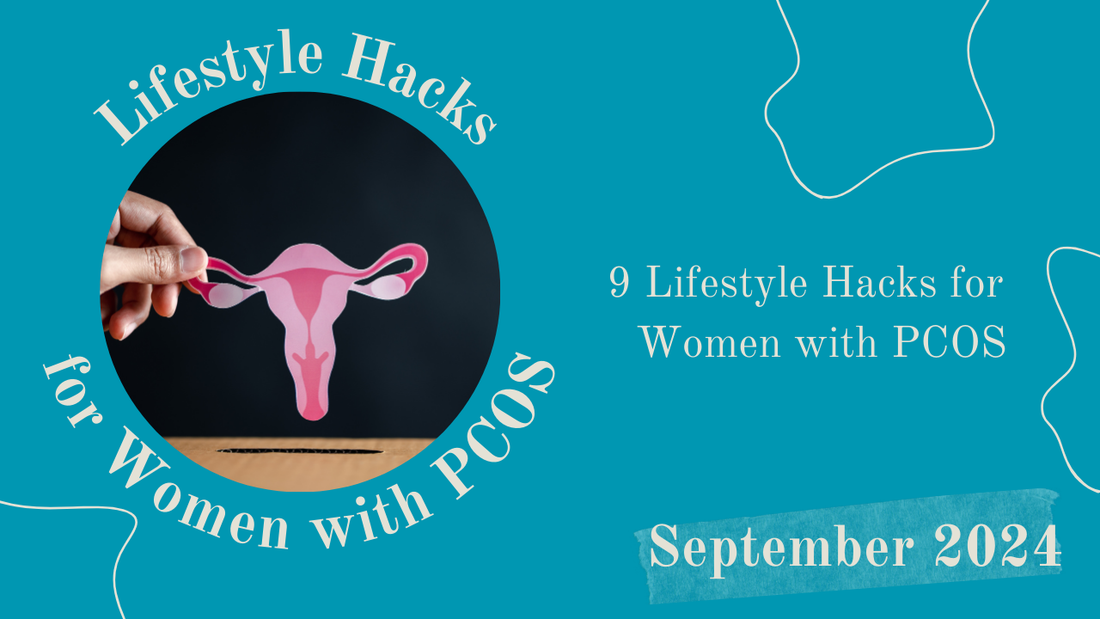September is Polycystic Ovarian Syndrome Awareness Month! PCOS is a hormone imbalance disorder that affects roughly one in ten women and is the leading cause of female infertility. There is no cure for PCOS, but PCOS is manageable with lifestyle changes. I am elated to share nine wellness hacks that can help women dealing with PCOS better manage their signs and symptoms.
Get your hormones checked at least twice a year
PCOS is a hormone imbalance disorder, studies show that women diagnosed with PCOS have higher androgens level. Androgen hormones are vital for the development and maintenance for reproductive health in women. Women with PCOS should be aware of their testosterone hormone, luteinizing hormone, follicular stimulating hormone, cortisol and estrogen hormone levels. One of the metrics used to determine if a woman may have PCOS is the LH/FSH ratio, usually this ratio is 2:1 in women with PCOS. To better manage your PCOS, be aware of your numbers. Your Primary Care Physician or Gynecologist can request blood work to be done to monitor your levels.
Manage Stress
Stress can impact our bodies in many ways. Women with PCOS should devote more time to ensuring their stress levels are under control. Our cortisol hormone affects our blood pressure, increase inflammation, and immune function. Our lifestyle can exacerbate our cortisol levels such as our caffeine intake, lack of sleep, and a diet high in sugar and processed foods. When cortisol levels are heightened in women with PCOS it can ultimately trigger an increase in our androgen levels.
Eat Mindfully
Our diet is a major factor in achieving optimal health. Women with PCOS should consider lifestyle changes to better manage their hormone imbalance disorder. A diet in high protein and one low in sugar and processed foods is ideal. It is important to pay attention to foods that inflames our body.
Move Your Body
Exercise is another major factor to achieving optimal health. To better manage symptoms of PCOS exercise is highly recommended, exercise can help decrease chronic diseases such as Type 2 Diabetes and Obesity which are linked to PCOS. Exercise can also decrease cortisol levels which ultimately affects androgen levels.
Be Curious about Your Body
No one knows your body better than you. If you are noticing changes in your body note it and share with your healthcare provider. Addressing issues as they arise can help save you from complicated challenges in the future. As a woman with PCOS, having a cycle calendar can help you track any abnormal changes. When reading your lab work, if you notice a change in levels inquire with your healthcare provider.
Be Responsible for Your Body
Have you heard of the saying, "You Only Have One Body, so Take Care of It". As mentioned earlier PCOS can be managed. It is our responsibility to try our best to manage our signs and symptoms. There are interventions available to help manage your PCOS symptoms, but it is our responsibility to take full authority of our bodies and stay on top of our health and wellness.
Supplement when Necessary
Supplements can be a helpful resource to manage your signs. Fish oil can be helpful to address inflammation. Probiotics can help with gut health and improve metabolism. PCOS can cause bloating and inflammation in the stomach. Zinc can help manage blood sugar levels and optimize hormone production. Some studies reveal that women with PCOS maybe Vitamin D deficient. Low Vitamin D levels can intensify PCOS symptoms. Please consult with your healthcare provider to ensure you're not causing more harm to your body.
Commit to being a Student Forever
A lifestyle is a way in which a person live. As we continue to learn about our body and stay inform with relevant research as it become available, I challenge you to stay committed to learning. New information and resources can be pivotal in you better managing your PCOS.
Don't Compare your Journey to Others
According to the most recent research, there are four different types of PCOS. Insulin resistant, Post-Pill, Adrenal and Inflammatory. Every woman with PCOS does not display the same signs and symptoms, hence what works for one person may not work for the other. It is important for you to be aware of your signs and know your hormone levels so that you are accurately managing your PCOS.
Now that you have helpful hacks to help you better manage your PCOS, I challenge you to adopt new lifestyle changes as we enter this Fall season. As always, continue to take care of yourself and show yourself grace.
xoxo,
Crafted By Nour

